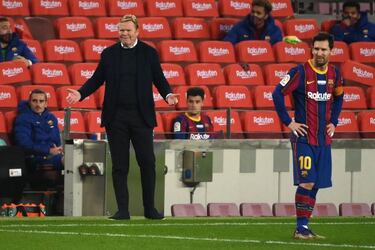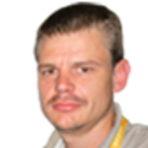Koeman on his situation at Barcelona: "It's out of our hands"
The Dutch coach spoke openly on a number of topics: “Messi is older, but he sill wants to win”. He also enthused about Pedri: "He's fantastic".

Ronald Koeman gave a lengthy interview to Barça Magazine in which he spoke about a number of topics relating to the current state of play at the club going into the Christmas break.
Playing without the public: "I played a lot of games here, and the fans always helped, so without them, and with just us on the pitch, it’s been very difficult. But it’s been the same for the other teams too; we are all facing difficulties because of Covid".
Covid-19 pandemic: "Covid was also something new for me, so it’s been hard. And yes, it does it show. It’s especially hard when we play at home, because it’s such a huge ground and you really sense that it’s empty, that there’s nobody here. After a while you might get used to playing without fans, but I think when the players go out onto the pitch and there is zero atmosphere, it’s something that is so strange. You really miss the atmosphere".
Catching coronavirus: "I really suffered in the sense that I was really unwell. I was so very tired and I had a fever. It was worse at night but I didn’t get it very badly. I did feel very unwell though, especially the tiredness".
Health in general, heart problems: "When things like that happen, or when people close to you get sick, then life does change. In my case I had a small stroke, and it does make you think about things differently. Perhaps managing Barça became a case of 'now or never.' I have already been coaching for several years, and I don’t want to still be coaching football when I’m 70. This was the right time".

Leaving the Netherlands job: "When they called me in January to ask if I’d be interested in coming, I said that I couldn’t leave the national team with four or five months to go before the Euros. In March, when I knew we wouldn’t be going to the Euros, my personal situation with Holland changed. We were expecting a normal European Championship, with fans, albeit in different countries, but then it all changed. Perhaps if it hadn’t have been for Covid I’d have had to wait another year".
Tony Bruins: "Tony and I coached Ajax together in 2003, and I remember when he learned that he had prostate cancer. He had had it for 17 years, it was something he’d learned to live with, doing chemotherapy. And I could see he was physically weakening. We’d talk a lot, we’d go for dinner together, and I’d visit him at home. He always advised me on opponents, on players, but he had become quieter and I knew why. But I didn’t think he was so close to the end. These are difficult things to cope with, and I don’t think he was able to live the kind of life that someone of his age should have been living. It was very hard and very sad for all his family, but I think that at the end of the day it might have been the best thing for Tony".
Telling wife, Bartina and children Debbie, Tim and Ronald about landing the Barça job: "Whenever Barça were looking for a new coach my name would come up, at the club and among the fans, but also from me because I often said that coaching Barça was always one of my dreams. Then the chance arose and my wife and children knew that I was very excited, and they actually preferred the idea of living here rather than in Holland. That’s not a sporting thing, it’s about life. We have always felt at home here, but most of all they knew that for me it was one of my biggest dreams. It was always my dream to coach Barcelona. I don’t think you should wait until the perfect moment for these things. If a team are getting good results, they don’t change coach. Changes happen when the people are unhappy, because the team aren’t winning. I don’t know if I’d call it bravery; I think any coach given that kind of chance would say they’re coming in. Because of the people’s affection for me, because of the club, because of my personal relationship – I know the club well, I know the people, and I played here for six years and was assistant to Van Gaal for a year and a half. I knew it was a difficult time and that there would be big changes at the club. But I’m a coach and I know we have to play well and win our games. The rest of it is out of my control".
Being a football legend: "Any coach that comes to Barça has to win and make the people happy. You could have a good name, and have been here before as a player, but ultimately it’s about the trophies and what you win. If you look at my coaching career, not just with Holland but at other places like Benfica, Valencia and Everton and Southampton in England, I wasn’t at big enough clubs to expect to win everything. Now I need to win over the fans and I have noticed that these things are not done easily. I feel that decisions need to be made, changes need to be made. Young players need to get their chances and after a time there need to be assessments. A coach has to work hard and show that they are up to coaching at a club like this".
Remaining true to your ideas: "It’s very important because it is much better to have faith in your own ideas because if you do lose your job and also change your ways, then it’s so much harder. It is important to find the right balance, to have people around you with whom you can discuss the decisions you have to make, but the lines need to be firmly set. It is also a clear message to the players. If a coach is black one day and white the next, you won’t get anywhere. If I lose, I have lost because of my ideas and my philosophy".
Koeman the player and Koeman the coach: "Most of all, the hunger to win, but that hasn’t changed. I want to see a team that plays, that dominates, but that also creates pressure, and football has also changed. In my time I was more about building from the back, but nowadays full backs are more like wingers. Football has changed, but I want to see my team winning, fighting, working… They need to play well but also need to be realistic about the way to get a good result".
Barcelona fifth Dutch coach: "I was with Michels in the national team. The only major trophy we have ever won was the European Championship in 1988 with Michels as coach. He was a coach with a lot of personality. You learn things from every coach, both positive and negative. I had Johan as a manager for a year at Ajax, before we were both at Barcelona. He was probably the best player in the world during his era and had so much information about the small details in football. I had six very successful years under him. And we were a great bunch of players both on and off the pitch, those were fantastic years. I was assistant to Van Gaal for a year and a half at Barça. The difference between Johan and Van Gaal is that Johan coached like a player, but Van Gaal was more of a professor, more methodological. Johan based things more on what he had seen, his feeling, his experience. I have played with Frank (Rijkaard) but not coached, although we did the coaching course together for a year".
🗣 ❝#Messi is having fun every day in training and he is very dedicated❞
— FC Barcelona (@FCBarcelona) December 24, 2020
— @RonaldKoeman pic.twitter.com/B8FuxjodLn
Resting Messi: "In theory, it’s the same for every player. If he is fit to play and good enough, then he will. But, of course, Leo is older than before, although he’s a player who still wants to be in games, and especially to win them. He trains hard every day. He’s very engaged. As I coach I like to speak to my players, and I also speak to Leo about this and other things because he’s also team captain. There are squad matters, rules, and we speak about a lot of things, not just the way we play. That’s part of a coach’s day-to-day, you need to be in communication with your players".
Ansu and Pedri: "
Related stories
It’s always nice to talk about youngsters. They deserve it, but they are also players that still have a lot to learn. But what Ansu and Pedri have done aged just 17 or 18 in such a big team as Barça is something very big. Pedri has come from Las Palmas very young and is already playing games against teams like Madrid and Juventus, and doing so fantastically. It's important for a club to have youngsters and for them to get chances. You need to switch the team around little by little. You still need the older players but they won’t be around forever and you need to plan changes in good time, calmly. Pedri has earned his place in games because of his work in training. He has shown me what a good player he is and that he is able to play in a team like Barcelona".
Institutional situation and club's finances: "It’s very difficult because it’s a matter that is totally out of our hands. I have always insisted that if they are calm in the head, they’ll be calm in their bodies. But every team needs a certain amount of peace of mind in order to win things".
